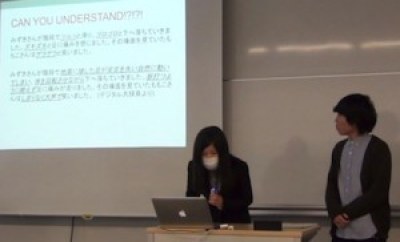人文学部ゼミブログ

2014.01.30
- 人文学部
- 英語英米文化学科
ホロウェル基礎ゼミ
ブログ投稿者:英語英米文化学科 教授 ジェイソン・ホロウェル

A common translation for the term基礎 in English is “foundation” and, of course, ゼミナール is “seminar”. The 基礎ゼミナール class is therefore an opportunity for first year students to study foundation (introductory) level material and to have the experience of studying in a seminar formatted classroom.
In my section of 基礎ゼミ students explore introductory topics in the field of linguistics, language acquisition, language teaching and learning, and language use.
要するに私の基礎ゼミは、言語学、言語習得、言語教育、言語使用について学ぶ入門的なゼミとなっており、2年次から履修できる英語学ゼミの入門授業とみなすことができます。

I often start by introducing and talking about a specific topic such as language teaching. We then have group discussions about how second languages should be taught, when second language teaching should begin, and what the goal of a second language education program should be.
グループディスカッションは慣れるにつれて、参加するのが楽しくなってきます。ゼミの内容が深く理解できる点で、学習効果はとても大きいです。
I try to emphasize the importance of actively participating in the class rather than just passively listening.

「自分から進んで学ぼうとする姿勢が大事ですよ」と私はしばしば言っています。「自ら」と言う言葉をよく使います。
For many students this is a new experience and it can be scary and intimidating but once they realize that their peers (the other students studying together with them) are all going through the same experience, they come to enjoy the stimulation and appreciate the opportunity to share their opinions and ideas.
Later in the semester after we have explored and talked about several topics, students form groups and work together on preparing a discussion session. The discussion session focuses on a topic that each group selects. The group is responsible for introducing the topic and leading the discussion that day.
学生主体のディスカッションは全員にとって刺激的な体験です。
This experience allows students to take a leadership role as they are responsible for both summarizing their topic and encouraging other students to share their opinions and ideas about the topic.

From somewhere around the second half of the semester to the end of the semester, 学生は新たなグループを作って期末に向けて発表プロジェクトを始めます。 各グループは授業内外で集まり、自分達で選んだトピックを研究します。
そして they prepare a presentation in which they tell the class about what they learned, why they think it is interesting and important and how the topic is relevant to the lives of everyone in the class. Students use visual aids such as PowerPoint slide shows to make sure that the content of their presentation is clear and easy to understand.
発表者だけではなく全員が発表に参加をし、they are all required to participate in each presentation by asking questions and, when appropriate, even challenging the ideas and information presented by their classmates.
期末の発表では、学生は自分達の研究や調査の発表をして、他の学生のフィードバック(意見)をもらいながら、自分達の発表内容についてさらに理解を深めます。
In my most recent 基礎ゼミ class, students chose a variety of topics for their final presentations. A few examples are:
■ The Function of Slang in English and Japanese (英語と日本語でのスラングの役割について) – Students were interested in slang, how it is formed, what function it has in a society, and whether there are difference between these points in English and Japanese.
■ English Education in Japan (日本での英語教育について)– Since all of the students have gone through the English education system in Japan, they all have opinions about the system and it’s strengths and weaknesses. Most students in this group were critical of the system and they had some very constructive ideas for improving the quality and thus the outcomes of English education in Japan.
■ Bilingualism (2言語使用能力—バイリンガル能力—について)– The students in this group were very interested in the topic of bilingualism and what it means to be bilingual. They spent a lot of time reading about neurological function in bilinguals and realized that they were going beyond the scope of study for the “foundation seminar”.
